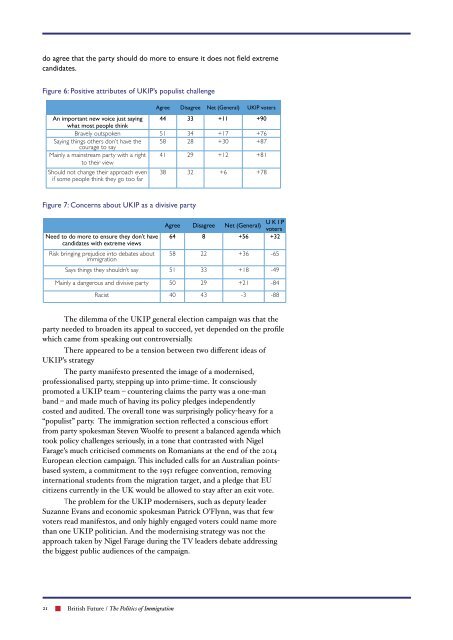THE POLITICS OF IMMIGRATION
The-politics-of-immigration
The-politics-of-immigration
You also want an ePaper? Increase the reach of your titles
YUMPU automatically turns print PDFs into web optimized ePapers that Google loves.
do agree that the party should do more to ensure it does not field extreme<br />
candidates.<br />
Figure 6: Positive attributes of UKIP’s populist challenge<br />
Agree Disagree Net (General) UKIP voters<br />
An important new voice just saying 44 33 +11 +90<br />
what most people think<br />
Bravely outspoken 51 34 +17 +76<br />
Saying things others don’t have the<br />
courage to say<br />
58 28 +30 +87<br />
Mainly a mainstream party with a right<br />
to their view<br />
41 29 +12 +81<br />
Should not change their approach even<br />
if some people think they go too far<br />
38 32 +6 +78<br />
Figure 7: Concerns about UKIP as a divisive party<br />
Need to do more to ensure they don’t have<br />
candidates with extreme views<br />
Risk bringing prejudice into debates about<br />
immigration<br />
Agree Disagree Net (General)<br />
UKIP<br />
voters<br />
64 8 +56 +32<br />
58 22 +36 -65<br />
Says things they shouldn’t say 51 33 +18 -49<br />
Mainly a dangerous and divisive party 50 29 +21 -84<br />
Racist 40 43 -3 -88<br />
The dilemma of the UKIP general election campaign was that the<br />
party needed to broaden its appeal to succeed, yet depended on the profile<br />
which came from speaking out controversially.<br />
There appeared to be a tension between two different ideas of<br />
UKIP’s strategy<br />
The party manifesto presented the image of a modernised,<br />
professionalised party, stepping up into prime-time. It consciously<br />
promoted a UKIP team – countering claims the party was a one-man<br />
band – and made much of having its policy pledges independently<br />
costed and audited. The overall tone was surprisingly policy-heavy for a<br />
“populist” party. The immigration section reflected a conscious effort<br />
from party spokesman Steven Woolfe to present a balanced agenda which<br />
took policy challenges seriously, in a tone that contrasted with Nigel<br />
Farage’s much criticised comments on Romanians at the end of the 2014<br />
European election campaign. This included calls for an Australian pointsbased<br />
system, a commitment to the 1951 refugee convention, removing<br />
international students from the migration target, and a pledge that EU<br />
citizens currently in the UK would be allowed to stay after an exit vote.<br />
The problem for the UKIP modernisers, such as deputy leader<br />
Suzanne Evans and economic spokesman Patrick O’Flynn, was that few<br />
voters read manifestos, and only highly engaged voters could name more<br />
than one UKIP politician. And the modernising strategy was not the<br />
approach taken by Nigel Farage during the TV leaders debate addressing<br />
the biggest public audiences of the campaign.<br />
21 British Future / The Politics of Immigration


